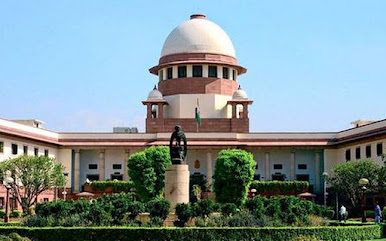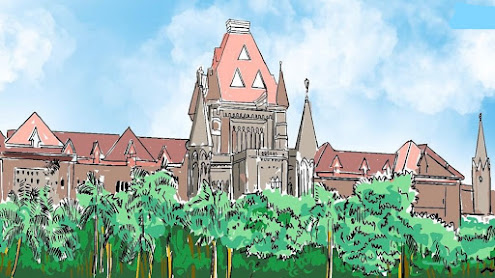Making allegations of corruption against Supreme Court Judges without proof and only on the basis of the conduct of the Judge in passing orders is permissible and not a contempt.
- Three Judge Bench of the Supreme Court closed the Contempt proceeding against Adv. Prashant Bhushan.
- Prashant Bhushan’s explanation that he called 8 CJI corrupt because they passed orders against the ethics and law, is accepted by the Court.
- In R.R Parekh’s case (2016) 14 SCC 1, also Supreme Court held that if a judge passes an order in wanton breach of the procedure then it is presumed that he acted with corrupt motives. No proof is required to prove his corruption.
- A similar view is taken by the Division Bench of Madras High Court on 15.09.2022 in S. Shankar’s case that, ‘specific allegation about corruption against a Judge is not contempt and it is protected as the right of freedom of speech as per Art.19 of the Constitution.
- SC observed that the court should observe restraint in such cases.
Brief Background:-
1. Adv. Prashant Bhushan in 2009 gave interview to the media that Eight
Chief Justices of India were corrupt.
On the basis of said interview the court took
cognizance of Contempt & issued notice to him. [Amicus Curiae Vs.
Prashant Bhushan & Anr. (2010) 7 SCC 592] [Contempt Petition
(Crl.) No. 10 of 2009 In Writ Petition (C) No. 202 of 1995].
Adv. Prashant Bhushan on 15th September,
2010 filed his affidavit giving explanation that why he called the 8
CJI as corrupt.
Link:- https://drive.google.com/file/d/1CaefycpTn5Ob2pv5U-xHysuro3BXS7Zz/view?usp=sharing
2. Para 6 of his affidavit reads thus;
“6. At the very outset however, I would like to
again clarify my statement regarding Justice Kapadia's handling of the Vedanta
case I reiterate that I had not imputed nor meant to impute lack of financial
integrity to Justice Kapadia. My statement as regards his actions in the
Vedanta case was in response to a question about "other ways in which
corruption manifests itself in the judiciary"; I was referring to other
ways in which the judicial process can get derailed or corrupted, by which I
meant, affected by extraneous considerations. I had understood the use of the
word "corruption/corrupt" here in the wide sense in which the Supreme
Court had interpreted in Dr. S. Dutt Vs. State of U.P (1966 1 SCR
493 at page 500), where the court had said, "The word
'corrupt' does not necessarily include the element of bribe taking. It is used
in a much larger sense as denoting conduct which is morally unsound or debased.
The word 'corrupt has been judicially construed in several casex, but we refer
here to two cases only. In Emperor Vs Rana Nana, Chief Justice Macleod
considered the word to be of wider import than the word fraudulently or
dishonestly and did not confine it to the taking of bribes or cases of bribery.
In Bibkhranjan Gupta Vs. The King. Mr. Justice Sen dealt at length with this
word. He was contrasting S. 196 with S. 471 and observed that the word
corruptly was not synonymous with dishonestly or fraudulently but was much wider.
According to him, it included conduct which was neither fraudulent nor
dishonest if it was otherwise blameworthy or improper."
3. He gave similar explanation for other Chief Justices of India.
4. Thereafter the matter was kept in cold storage for around 10 years.
5. In 2020 the matter was again taken on record for disposal.
6. On 17th August 2020, the court framed
three questions in Amicus Curiae Vs. Prashant
Bhusan and Anr. (2020) 16 SCC 333 as under;
“2. The question that has been framed by this
Court has certain far-reaching ramifications on which we would like to hear the
learned counsel for the parties.
3. We would also like the learned counsel to
address this Court on the following additional issues:
(i) In case a public statement as to corruption
by a particular Judge(s) is permissible, under what circumstances and on what
basis, it can be made, and safeguards, if any, to be observed in that regard?
(ii) What procedure is to be adopted to make
complaint in such cases when the allegation is about the conduct of a sitting
Judge?
(iii) Whether against retired Judge(s), any
allegation as to corruption can be made publicly, thereby shaking the
confidence of general public in the judiciary; and whether the same would be
punishable under the Contempt of Courts Act?”
7. On 24.08.2020, Adv. Prashant Bhushan gave additional revised
questions as under;
“1. Whether the expression of a bona fide opinion
about the extent of corruption in any section of the judiciary would amount to
contempt of Court?
2. If the answer to Question 1 is in the
affirmative, whether
the person who
expresses such an opinion about the extent of corruption in a section of
judiciary is obliged to prove that his opinion is correct or whether it is
enough to show that he bona fide held that opinion?
3. Since fetters on Article 19(1)(a) rights can
only be imposed under Article 19(2) by a law made by the State which imposes
reasonable restrictions inter alia in relation to contempt of court, and such
law insofar as the Hon’ble Supreme Court is concerned can be framed by
Parliament
under Article
246 read with Entry 77 in List I of the Seventh Schedule, and such law has in
fact been framed by Parliament in 1971, whether the Supreme Court in
exercise of its
powers under Article 129 can curtail free speech and expression only to the
strict and limited extent permissible under the Contempt of Courts Act,1971?
5. (a) Whether the Contempt of
Courts Act, 1971 ought to bear on the manner in which the vast discretion in
relation to contempt proceedings under Articles 129
and 215 of the
Constitution is exercised?
(b) Whether, in answer to the foregoing question,
the conflicting pronouncements of this Hon’ble Court in Pallav Sheth v.
Custodian (2001) 7 SCC 549 and in re Prashant Bhushan, SMC (Crim.) No. 1 of
2020 (decided 14th August 2020) deserve re-examination?
7. Whether, after the interconnected reading of
Articles 14,19 & 21 in RC Cooper v. Union of India (1970) 1 SCC248 (11
Judges) and in Maneka Gandhi v. Union of India (1978) 1 SCC 248 (7 Judges), the
law of contempt should be subject to the concepts enumerated in these
decisions, both in relation of the Contempt of Courts Act,1971 as well as
Articles 129 & 215 of the Constitution of India?
8. Whether cases relating to Section 2(c)(i) of
the Contempt of Courts Act 1971 decided before its enactment need to be
re-examined in the light of the Contempt of Courts Act, 1971 and judgments
interpreting it?
9. Whether the in-house procedure for dealing
with complaints against judges laid down in C. Ravichandran Iyer v. Justice
A.M. Bhattacharjee and
Ors. (1995) 5
SCC 457 prevents complainants, participants in the procedure and others from
discussing the matter in the public domain?
10. Whether the decision in C. RavichandranIyer
v. Justice A.M. Bhattacharjee and Ors. (1995) 5 SCC 457 is compatible with
constitutional limitations including those contained in Articles 19(2) and 14?”
8. The Court on 25th August, 2020 in Amicus
Curiae Vs. Prashant Bhusan and Anr. 2020 SCC OnLine SC 695 passed
following order;
“1. There is paucity of time otherwise we would have heard the learned
senior counsel with respect to the questions which have been proposed. However,
since the matter is pending for the last 10 years, as prayed for, we fix the
date for hearing in the month of September, 2020.”
9. Then on 13th October, 2020 in Amicus
Curiae Vs. Prashant Bhusan and Anr. 2020 SCC OnLine SC 1049 the
Court passed following order;
“1. Pursuant to our order dated 10.09.2020, learned Attorney General has
appeared in the matter. He has suggested to take up this matter on some other
day so that in the meantime, he would consider of reformulating the
points required to be addressed in these proceedings.”
10. Thereafter when matter listed on 30th August,
2022 in Amicus Curiae Vs. Prashant Bhusan and
Anr. 2022 SCC OnLine SC 1188, the Supreme Court closed the
case by taking the note of explanation given by Adv. Prashant Bhusan and
apology given by ‘Tahalka’ magazine editor. The order reads
thus;
“1. The alleged acts of contempt, that gave rise to this Contempt
Petition are stated to have been committed on or about 5th September,
2009. The proceedings have been pending for 13 years.
2. In view of the explanation/apology tendered by the respondents,
we do not deem it necessary to proceed with the contempt. Magnanimity and
restraint are also facets of the majesty of this Court.
3. The contempt proceedings are accordingly dropped.”
11. In R. R. Parekh Vs. High Court of Gujrat (2016) 14 SCC 1, it
is ruled as under;
“A Judge passing an order against provisions of law
in order to help a party is said to have been actuated by an oblique
motive or corrupt practice - breach of the governing principles of law or
procedure by a Judge is indicative of judicial officer has been actuated by an
oblique motive or corrupt practice - No direct evidence is necessary - A charge
of misconduct against a Judge has to be established on a preponderance of
probabilities - The Appellant had absolutely no convincing explanation for this
course of conduct - Punishment of compulsory retirement directed.”
12. In The Registrar vs. Mr. S. Shankar 2022
SCC OnLine Mad ___ it is ruled as under;
“A] Making specific allegations of corruption against a Judge, based on
prima facie evidence would definitely fall within the ambit of the right to
freedom of speech and expression. It is the right of the contemnor.”




Ab koi gulshan na ujade, ab watan azad hai. Vijay Kumar Agarwal, Ex-IAS, Mobile: 9560172716
ReplyDelete